(!)NOTE : Windows 7 users won’t be able to use some latest features of eCatalog/WOS since Microsoft is ending support for Windows 7 on 14 Jan, 2020. Please upgrade your system for uninterrupted services.
- Notice of End of Sales for Economy Series Pneumatic Equipment Category. More information.
NABEYA BI-TECH Spring Plungers(Tip Surface Treatment:Nitriding Treatment)
Brand |
|
|---|---|
| CAD |
|
| Days to Ship |
|
2 items
- Sort By
-
You can add up to 6 items per a category to the compare list.
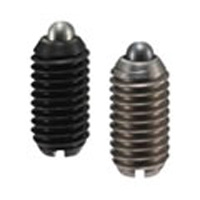
NABEYA BI-TECH
Light-load and heavy-load types available in steel and stainless steel.
Outer Dia. M(mm) Stroke S(mm) Tip Material Body Material Mounting Method Initial Load (Range)(N) Lock Tip Heat Treatment Screw Type of Pin Plunger Wrench Hole Shape Main Body Surface Treatment Tip Surface Treatment 4 ~ 24 1.5 ~ 8 Stainless Steel Stainless Steel Screw-In 0.01~50 / 50.01~100 Not Provided Not Provided Spherical Negative Not Provided Nitriding Treatment From: ₹ 629.89 Days to Ship: 5 Day(s) or more  5 Day(s) or more
5 Day(s) or more
-
You can add up to 6 items per a category to the compare list.
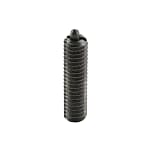

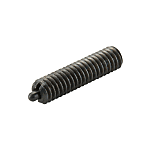
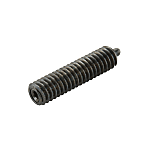
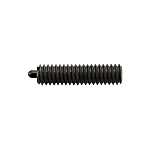
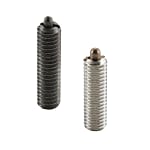
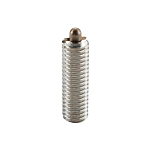
NABEYA BI-TECH
[Features]
· Both of the steel and stainless steel plungers are available with plastic pins.
· PsF: Light load, steel plunger.
· PSF-SN: Light load, full stainless steel plunger.
· PSN: Light load, steel plunger with plastic pin.
· PSF-KN: Light load, stainless steel plunger with plastic pin.
· PSF-ss: Heavy load, steel plunger.Outer Dia. M(mm) Stroke S(mm) Tip Material Body Material Mounting Method Initial Load (Range)(N) Lock Tip Heat Treatment Screw Type of Pin Plunger Wrench Hole Shape Main Body Surface Treatment Tip Surface Treatment 4 ~ 16 1.5 ~ 5 Stainless Steel Stainless Steel Screw-In 0.01~50 Not Provided Not Provided Spherical / With Hex Socket Hex Not Provided Nitriding Treatment From: ₹ 1,140.20 Days to Ship: 5 Day(s) or more  5 Day(s) or more
5 Day(s) or more
| Brand |
|---|
| Product Series |
| CAD |
| From |
| Days to Ship |
| Outer Dia. M(mm) |
| Stroke S(mm) |
| Tip Material |
| Body Material |
| Mounting Method |
| Initial Load (Range)(N) |
| Lock |
| Tip Heat Treatment |
| Screw Type of Pin Plunger |
| Wrench Hole Shape |
| Main Body Surface Treatment |
| Tip Surface Treatment |
You can add up to 6 items per a category to the compare list. | You can add up to 6 items per a category to the compare list. | |
| Brand | NABEYA BI-TECH | NABEYA BI-TECH |
| Product Series | ||
| CAD |
|
|
| From | ₹ 629.89- | ₹ 1,140.20- |
| Days to Ship | 5 Day(s) or more | 5 Day(s) or more |
| Outer Dia. M(mm) | 4 ~ 24 | 4 ~ 16 |
| Stroke S(mm) | 1.5 ~ 8 | 1.5 ~ 5 |
| Tip Material | Stainless Steel | Stainless Steel |
| Body Material | Stainless Steel | Stainless Steel |
| Mounting Method | Screw-In | Screw-In |
| Initial Load (Range)(N) | 0.01~50 / 50.01~100 | 0.01~50 |
| Lock | Not Provided | Not Provided |
| Tip Heat Treatment | Not Provided | Not Provided |
| Screw Type of Pin Plunger | Spherical | Spherical / With Hex Socket |
| Wrench Hole Shape | Negative | Hex |
| Main Body Surface Treatment | Not Provided | Not Provided |
| Tip Surface Treatment | Nitriding Treatment | Nitriding Treatment |
Loading...
Configure
Specification/Dimensions
-
Outer Dia. M(mm)
-
Stroke S(mm)
-
Tip Material
- Steel
- Stainless Steel
- Plastic
- Others
-
Body Material
- Steel
- Stainless Steel
- Aluminum
-
Mounting Method
- Screw-In
- Press Fit
- Screw Clamp
-
Initial Load (Range)(N)
-
Lock
- Not Provided
- Provided
-
Tip Heat Treatment
-
Screw Type of Pin Plunger
-
Wrench Hole Shape
-
Main Body Surface Treatment
-
Tip Surface Treatment
Narrow search by specifying Manufacturer
Related Categories to Spring Plungers
FAQ Spring Plungers
- Question: How do spring plungers contribute to the efficiency of injection molding processes?
- Answer: Spring plungers boost injection molding efficiency by securely holding mold components, ensuring precise alignment for consistent results. During setup, they allow quick and effortless adjustment, reducing downtime. Their spring-loaded design maintains component position while enabling easy repositioning, simplifying the process. By streamlining setup and operation, spring plungers enhance productivity in injection molding, benefiting manufacturers by saving time and improving overall efficiency.
- Question: What are spring plungers used for?
- Answer: Spring plungers have a wide range of applications, especially in manufacturing. Here are some common uses:
Positioning and alignment: Spring plungers can be used to precisely position and align components during assembly.
Retention: They can hold objects in place, like detents in latches or catches in housings.
Ejection: Spring plungers can eject parts from molds or fixtures.
Applying pressure: They can apply a controlled amount of force for tasks like clamping or activating switches. - Question: What is the importance of ball plungers in automation?
- Answer: Ball plungers are important in automation because they help things get in the right spot and stay there. Even though they're small, they're super good at making sure parts are in the exact place they need to be. They're used in tools and fixtures to keep stuff secure and move it exactly where it needs to go on the assembly line. Ball plungers are great because they make sure everything runs smoothly and works well, making factories more efficient and products better.
- Question: What materials are spring plungers typically made of?
- Answer: Spring plungers are commonly made of materials such as stainless steel, carbon steel, brass, and plastic. The choice of material depends on factors like the application requirements, environmental conditions, and desired durability.
- Question: What role do locating, positioning, jigs & fixtures play in plunger technology?
- Answer: Locating, positioning, jigs, and fixtures are super important in plunger technology. Locating mechanisms make sure plungers and workpieces are in the right spot for machining or assembly, reducing mistakes. Positioning devices control how plungers move, so they go exactly where they're supposed to. Jigs and fixtures hold everything in place securely during machining or assembly, which helps prevent errors and makes things work faster and better. Overall, these parts work together to make plunger technology work smoothly and produce high-quality results.
- Question: What are the characteristics of spring plungers with flat tip?
- Answer: Spring plungers with flat tips are versatile tools designed for precise positioning and secure holding of components. Their flat tip ensures even pressure distribution, minimizing the risk of damage to surfaces. These plungers provide strong retention force, securely holding components in place. Some models allow for adjusting the spring tension to customize the holding force. Made from durable materials like steel or stainless steel, they offer longevity and resistance to wear. They are easy to install and replace, making setup and maintenance hassle-free.
- Question: What are the key considerations when selecting materials for plungers?
- Answer: When selecting materials for plungers, consider their strength, durability, and corrosion resistance. Ensure they can withstand operational forces without wearing out quickly. Check if they're resistant to rust and can handle the temperatures they'll encounter. Also, factor in the cost and ease of manufacturing. By evaluating these factors, you can choose materials that meet the needs of your application, providing long-lasting performance without breaking the bank. Ultimately, selecting the right materials ensures reliable and efficient operation of plungers in various industrial settings.








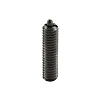












How can we improve?
How can we improve?
Thank you for your time.
Your feedback is essential for our continuous improvement
Privacy Policy
Thank you for your cooperation.
Thank you for your time.
Your feedback is essential for our continuous improvement
Please use the inquiry form.
Privacy Policy